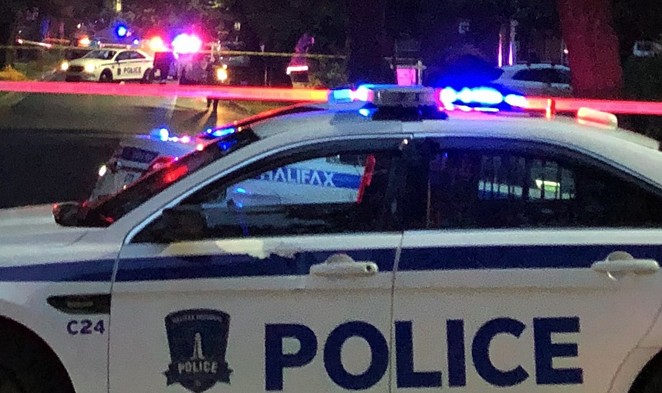Cops shouldn’t respond to mental health calls

Wednesday, September fourth’s Board of Police Commissioners agenda was weighty: cops for sale, suicide prevention, and a report criticizing the police.
At the last meeting, the Board was supposed to talk about HRP officers working extra duty (i.e. protecting Superstore’s profits while in uniform) and off duty (i.e. working at Superstore), but it was deferred to Wednesday’s meeting, where it was once again deferred.
The board then got a presentation from Nancy Saunders and Heather Spidell, two women who are part of the Nova Scotia Moms. This is an advocacy group made up of women who have lost children to suicide, and they’re asking anyone who will listen for some changes that could prevent the tragedy that befell their families. They are proposing two legislative changes that would have to come from the province. First, they want to loosen doctor/patient confidentiality rules that harm patients: In Nova Scotia, health care providers can’t talk to someone’s support network without consent unless the person is in immediate harm. Other provinces have changed their legislation to allow healthcare providers to bring in a patient’s support network if that patient is at risk of suicide.
The other thing the mothers want to see from the provincial government is a change to the legislation that requires police officers to wait at hospitals on mental health calls. This is a massive waste of police resources and something the municipality has been requesting from the province for a while.
As for why the moms were talking to the city’s police board, there are a couple things. They want Halifax’s police officers to get trauma-informed training. They’re also looking for the city to stop sending police officers to mental health calls, for a few pretty good reasons. Like the fact that police exist to enforce laws, and they do so by arresting people or, occasionally, if the need exists, violence. Since being suicidal is not a crime, police don’t need to show up because there’s no need to arrest anyone if no crimes are being committed.
Although not mentioned, another pretty good reason cops shouldn’t respond is carried on the hips of officers. Guns are tools of death, and sending police officers into a situation where death is a desired outcome is a recipe for disaster. The good news is that de-tasking the police is high on the list of priorities in the HRM’s ongoing police reform; the city started that work earlier this year.
After the presentation was the agenda’s spiciest item: The independent review of the Shelter Siege of August 18, 2021.
This report is huge and critical of how the city, the police and the board handled the cruelty of removing desperate members of the public from public land. This report came into existence because the Board of Police Commissioners did its job a few years when former board member Harry Critchley first asked for this report. For this report to become actioned accountability that results in institutional change and improves the lives of Haligonians the Board has to follow a process with this report. It has to send the report to council, and to the CAO and to HRP for their response to this critical report.
One criticism of the board in the report is that while it has substantial power—and responsibility—to direct the police, it shirks that responsibility by refusing to use that power. This abdication of duty as documented from August, 2021 was displayed again on Wednesday, 2024 when commissioner Lisa Blackburn checked with HRM’s lawyers to ensure it was okay for the board to direct the police chief to learn lessons from this report. In this instance, city lawyers said yes. However, the report’s findings imply that the city’s legal council sometimes does not allow the board to direct the police when the board should actually be able to so.
During the debate, commissioner Lisa Blackburn told everyone that we shouldn’t expect too much from the HRP and city staff reports because several key city officials—the former CAO, the former parks director and the former police chief—didn’t participate in this independent review. After the meeting, Blackburn issued a statement to the media saying she misspoke and former CAO Jaques Dubé did, in fact, participate in the independent review. And the other good news is that many emails were also sent about the incident.
In the final item of business, the board decided to ask council for $25,000 to conduct rolling polls in the HRM about policing to better inform policy moving forward. We’ll let you know how this goes when it arrives on council’s agenda.



